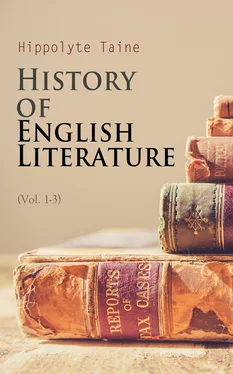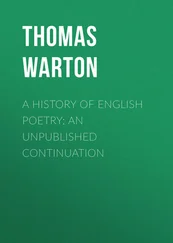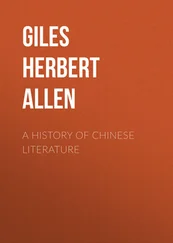"These are the funeral tears,
Shed on your grave; these furrow'd-up my cheeks
When first I lov'd and knew not how to woo....
Give me your hand: how sweetly life doth run
In these well-colour'd veins! How constantly
These palms do promise health!...
Kiss me again, forgive me.... Farewell." [467]
He then stabs her, enters the banqueting room, with her heart upon his dagger:
"Soranzo see this heart, which was thy wife's.
Thus I exchange it royally for thine." [468]
He kills him, and casting himself on the swords of banditti, dies. It would seem that tragedy could go no further.
But it did go further; for if these are melodramas, they are sincere, composed, not like those of to-day, by Grub Street writers for peaceful citizens, but by impassioned men, experienced in tragical arts, for a violent, over-fed, melancholy race. From Shakespeare to Milton, Swift, Hogarth, no race has been more glutted with coarse expressions and horrors, and its poets supply them plentifully; Ford less so than Webster; the latter a sombre man, whose thoughts seem incessantly to be haunting tombs and charnel-houses. "Places in court," he says, "are but like beds in the hospital, where this man's head lies at that man's foot, and so lower and lower." [469]Such are his images. No one has equalled Webster in creating desperate characters, utter wretches, bitter misanthropes, [470]in blackening and blaspheming human life, above all, in depicting the shameless depravity and refined ferocity of Italian manners. [471]The Duchess of Malfi has secretly married her steward Antonio, and her brother learns that she has children; almost mad [472]with rage and wounded pride, he remains silent, waiting until he knows the name of the father; then he arrives all of a sudden, means to kill her, but so that she shall taste the lees of death. She must suffer much, but above all, she must not die too quickly! She must suffer in mind; these griefs are worse than the body's. He sends assassins to kill Antonio, and meanwhile comes to her in the dark, with affectionate words; he pretends to be reconciled, and suddenly shows her waxen figures, covered with wounds, whom she takes for her slaughtered husband and children. She staggers under the blow, and remains in gloom without crying out. Then she says:
"Good comfortable fellow,
Persuade a wretch that's broke upon the wheel
To have all his bones new set; entreat him live
To be executed again. Who must despatch me?...
Bosola. Come, be of comfort, I will save your life. Duchess. Indeed, I have not leisure to tend So small a business. B. Now, by my life, I pity you. D. Thou art a fool, then, To waste thy pity on a thing so wretched As cannot pity itself. I am full of daggers." [473]
Slow words, spoken in a whisper, as in a dream, or as if she were speaking of a third person. Her brother sends to her a company of madmen, who leap and howl and rave around her in mournful wise; a pitiful sight, calculated to unseat the reason; a kind of foretaste of hell. She says nothing, looking upon them; her heart is dead, her eyes fixed, with vacant stare:
" Cariola. What think you of, madam? Duchess. Of nothing: When I muse thus, I sleep. C. Like a madman, with your eyes open? D. Dost thou think we shall know one another In the other world? C. Yes, out of question. D. O that it were possible we might But hold some two days' conference with the dead! From them I should learn somewhat, I am sure, I never shall know here. I'll teach thee a miracle; I am not mad yet, to my cause of sorrow: The heaven o'er my head seems made of molten brass, The earth of flaming sulphur, yet I am not mad. I am acquainted with sad misery As the tann'd galley-slave is with his oar...." [474]
In this state, the limbs, like those of one who has been newly executed, still quiver, but the sensibility is worn out; the miserable body only stirs mechanically; it has suffered too much. At last the gravedigger comes with executioners, a coffin, and they sing before her a funeral dirge:
" Duchess. Farewell, Cariola... I pray thee, look thou giv'st my little boy Some syrup for his cold, and let the girl Say her prayers ere she sleep.—Now, what you please: What death? Bosola. Strangling; here are your executioners. D. I forgive them: The apoplexy, catarrh, or cough o' the lungs Would do as much as they do.... My body Bestow upon my women, will you?... Go, tell my brothers, when I am laid out, They then may feed in quiet." [475]
After the mistress the maid; the latter cries and struggles:
" Cariola. I will not die; I must not; I am contracted To a young gentleman. 1st Executioner. Here's your wedding-ring. C. If you kill me now, I am damn'd. I have not been at confession This two years. B. When? [476] C. I am quick with child." [477]
They strangle her also, and the two children of the duchess. Antonio is assassinated; the cardinal and his mistress, the duke and his confidant, are poisoned or butchered; and the solemn words of the dying, in the midst of this butchery, utter, as from funereal trumpets, a general curse upon existence:
"We are only like dead walls or vaulted graves,
That, ruin'd yield no echo. Fare you well....
O this gloomy world!
In what a shadow, or deep pit of darkness,
Doth womanish and fearful mankind live!" [478]"In all our quest of greatness, Like wanton boys, whose pastime is their care, We follow after bubbles blown in the air. Pleasure of life, what is't? only the good hours Of an ague; merely a preparative to rest, To endure vexation.... Whether we fall by ambition, blood, or lust, Like diamonds, we are cut with our own dust." [479]
You will find nothing sadder or greater from the Edda to Lord Byron.
We can well imagine what powerful characters are necessary to sustain these terrible dramas. All these personages are ready for extreme acts; their resolves break forth like blows of a sword; we follow, meet at every change of scene their glowing eyes, wan lips, the starting of their muscles, the tension of their whole frame. Their powerful will contracts their violent hands, and their accumulated passion breaks out in thunderbolts, which tear and ravage all around them, and in their own hearts. We know them, the heroes of this tragic population, Iago, Richard III, Lady Macbeth, Othello, Coriolanus, Hotspur, full of genius, courage, desire, generally mad or criminal, always self-driven to the tomb. There are as many around Shakespeare as in his own works. Let me exhibit one character more, written by the same dramatist, Webster. No one, except Shakespeare, has seen further into the depths of diabolical and unchained nature. The "White Devil" is the name which he gives to his heroine. His Vittoria Corombona receives as her lover the Duke of Brachiano, and at the first interview dreams of the issue:
"To pass away the time, I'll tell your grace
A dream I had last night."
It is certainly well related, and still better chosen, of deep meaning and very clear import. Her brother Flaminio says, aside:
"Excellent devil! she hath taught him in a dream
Читать дальше












